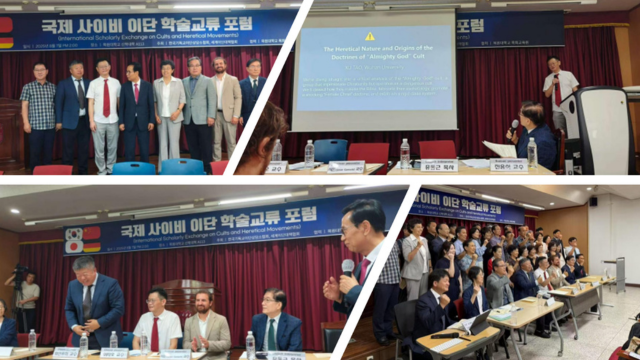Unholy Alliances: China, Japan, Korea, and the Global Anti-Cult Crusade
Images of the symposium in Korea. From Weibo.
by Massimo Introvigne
In a world increasingly divided along ideological lines, a strange and concerning alliance has formed—one that brings together Christian fundamentalists with extreme secularists and promoters of religious repression. The clear indication: a recent international symposium at Daejeon’s Mokwon University in South Korea, kept almost secret there but proudly documented a few days ago by the China Anti-Xie Jiao Association, a large propaganda branch of the Chinese Communist Party (CCP) working through the United Front. The topic was how to fight against so-called “heresies” and “cults.” The actual goal: how to suppress religious minorities that oppose left-leaning secularism and threaten the Chinese Communist Party.
The CCP sent a strong delegation to Korea, including Xu Tao, director of the Hubei Anti-Xie Jiao Association; Zhang Chunli, a professor at the Chinese People’s Public Security University, the university of the regime’s police, who once engaged in dialogue with Western scholars of new religious movements but now seems fully aligned with the CCP’s repressive efforts; and Chen Dequan, an associate professor at Northeastern University in Shenyang, Liaoning.
The China Anti-Xie Jiao Association, which claims to be the world’s largest anti-cult organization, is not just a watchdog of Communist orthodoxy. It functions as a weaponized bureaucracy, designed to delegitimize and dismantle religious groups that operate outside the CCP’s ideological boundaries. Its primary targets in China include Falun Gong and The Church of Almighty God (CAG), a Christian new religious movement whose members have been tortured, imprisoned, and in some cases, killed for their faith.
The involvement of Chinese experts in repression in South Korea is noteworthy. It aligns with a widespread crackdown against the Unification Church and other conservative religious groups by the recently elected, left-leaning Korean government.
The gathering also included enthusiastic participation from Christian pastors and scholars from Korea, Japan, and Germany—individuals who, by any moral standard, should be defending religious liberty, not plotting to suppress it.
The Korean delegation, led by the World Association Against Heresy, has a well-documented history of collaborating with Chinese intelligence agencies. Their mission? To harass believers of the anti-Communist Unification Church and other new religious movements that disrupt the CCP by converting Chinese citizens, including Shincheonji, all around the world. They also travel internationally, urging democratic governments to deport CAG asylum seekers back to China, where they face almost certain persecution. These are not idle threats. The United Nations Committee Against Torture has explicitly warned that deported CAG members are at risk of torture and inhumane treatment in China.
Among the attendees was Hiroko Nakanishi, a longtime opponent of the Unification Church (now called the Family Federation for World Peace and Unification) and a Japanese scholar supporting the effort to legally dissolve that Church in Japan. Nakanishi co-authored a controversial book against the Unification Church with anti-cult scholar Yoshihide Sakurai.
Nakanishi’s presence at the event in Korea was no coincidence — it was symbolic. The Japanese anti-cult scholar’s participation alongside Chinese repression officials and Korean anti-cult activists affirms two points: (a) the anti-Unification Church campaign in Japan is not just a domestic issue but involves China (not implying China is the sole supporter); and (b) the same ideological system is now being used against the Unification Church and other religious minorities in Korea, with backing from both China and Japan.
German Evangelical apologist Simon Garrecht, who was also present, emphasizes a troubling trend: the exploitation of well-meaning but naive European Christians who believe they are defending orthodoxy, but are actually endorsing a Chinese-led global campaign of religious persecution. The irony is stark. Evangelical pastors—whose own faith traditions were once persecuted—now stand shoulder to shoulder with agents of a regime that imprisons Christians for unauthorized Bible studies.
This isn’t a theological debate; it’s a geopolitical move. The CCP has long known that controlling religion means controlling thought. By working with Christian scholars and pastors abroad, it gains moral cover for its domestic repression and spreads its influence into democratic countries.
Let’s be clear: the word “cult” isn’t just a neutral term. It’s a weapon. When used by regimes and their allies, it becomes a tool for exclusion, imprisonment, and erasure. The global religious liberty community must oppose this vile alliance.
Religious freedom is not a privilege granted by the government but a right inherent to human dignity. To betray it in the name of orthodoxy is to betray the very core of faith. And to those Christian pastors and scholars who have chosen to collaborate with the machinery of repression: history will not be kind.
Source: https://bitterwinter.org/unholy-alliances-china-japan-korea-and-the-global-anti-cult-crusade/

